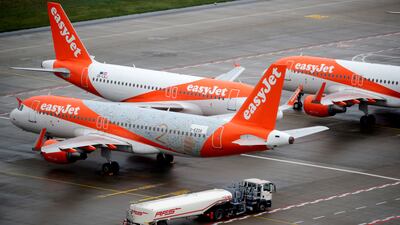EasyJet has announced plans to remove seats from its planes so they can fly with fewer crew members and tackle the staff shortages the airline is facing.
The number of crew needed on flights is dictated by the number of passengers flying and is set by the Civil Aviation Authority.
By removing the back row of seats on its A319 planes, the budget airline will limit the number of passengers onboard to 150, which requires three crew members instead of four.
EasyJet told the PA news agency that this was an “effective way” of operating its fleet this summer.
“This summer we will be operating our UK A319 fleet with a maximum of 150 passengers onboard and three crew in line with CAA regulations,” the airline said.
“This is an effective way of operating our fleet while building additional resilience and flexibility into our operation this summer, where we expect to be back to near 2019 levels of flying.”
European airlines, including easyJet, were forced to cancel thousands of flights in the lead-up to Easter.
The airline expects to operate “near” pre-pandemic levels of flying this summer. It operated at 80 per cent of 2019 capacity in the first three months of this year.
Bib%20Gourmand%20restaurants
%3Cp%3EAl%20Khayma%0D%3Cbr%3EBait%20Maryam%0D%3Cbr%3EBrasserie%20Boulud%0D%3Cbr%3EFi'lia%0D%3Cbr%3Efolly%0D%3Cbr%3EGoldfish%0D%3Cbr%3EIbn%20AlBahr%0D%3Cbr%3EIndya%20by%20Vineet%0D%3Cbr%3EKinoya%0D%3Cbr%3ENinive%0D%3Cbr%3EOrfali%20Bros%0D%3Cbr%3EReif%20Japanese%20Kushiyaki%0D%3Cbr%3EShabestan%0D%3Cbr%3ETeible%3C%2Fp%3E%0A
Banthology: Stories from Unwanted Nations
Edited by Sarah Cleave, Comma Press
White hydrogen: Naturally occurring hydrogen
Chromite: Hard, metallic mineral containing iron oxide and chromium oxide
Ultramafic rocks: Dark-coloured rocks rich in magnesium or iron with very low silica content
Ophiolite: A section of the earth’s crust, which is oceanic in nature that has since been uplifted and exposed on land
Olivine: A commonly occurring magnesium iron silicate mineral that derives its name for its olive-green yellow-green colour
Springsteen: Deliver Me from Nowhere
Director: Scott Cooper
Starring: Jeremy Allen White, Odessa Young, Jeremy Strong
Rating: 4/5
House-hunting
Top 10 locations for inquiries from US house hunters, according to Rightmove
- Edinburgh, Scotland
- Westminster, London
- Camden, London
- Glasgow, Scotland
- Islington, London
- Kensington and Chelsea, London
- Highlands, Scotland
- Argyll and Bute, Scotland
- Fife, Scotland
- Tower Hamlets, London






















